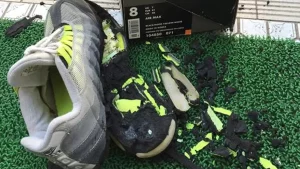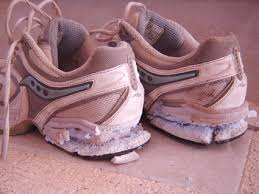When it comes to shoes, no one wants their shoes to fall apart. If they do, the design of the shoe is compromised, and the effectiveness of the shoe in providing what the foot needs is lost.
Why Do Shoes Disintegrate And Crumble
Shoes can disintegrate and crumble due to several reasons, including:
- Age: Shoes, like any other material, can degrade over time. Exposure to sunlight, heat, and humidity can accelerate the aging process and cause the shoes to become brittle and fall apart.
- Poor quality materials: Shoes made with low-quality materials are more prone to disintegrating and crumbling. Inferior materials can break down faster, especially if exposed to environmental factors such as moisture or heat.
- Lack of use: Shoes that are left unused for a long time can dry out and become brittle, making them more prone to disintegrating and crumbling.
- Exposure to moisture: Shoes that are frequently exposed to moisture or water can cause the materials to break down faster. Prolonged exposure to moisture can lead to rotting, mildew, and mold, which can cause the shoes to disintegrate.
- Chemical exposure: Exposure to chemicals, such as solvents, acids, and oils, can cause the shoes’ materials to weaken and break down, leading to disintegration and crumbling.
More Explanation
The three types of soles break down as follows
- Polyurethane soles – due to hydrolysis
- Rubber soles – as the chemicals begin to dry out, the soles become brittle and crack.
- EVA soles … Due to repeated loading when walking or running.
Shoes made of certain materials disintegrate and become porous and soft when stored in a warehouse or wardrobe for long periods of time without being worn. As a result, holes, and cracks develop and eventually collapse.
This is due to the chemicals in the rubber that makes the shoes soft. This happens when shoes are stored in a warehouse or chest of drawers for an extended period of time. Moisture and heat react with the chemicals in the rubber, and deterioration begins.
This causes holes that lead to cracks in the soles. This chemical degradation can also occur when large amounts of water are used on rubber soles.
The use of water on rubber soles is especially important because it removes the plasticizers that protect the rubber soles.
PU resin soles are prone to disintegration due to the oxidation of the polymer chains.
Also Read: Are Converse Skate Shoes Good
 Why Do Pu Soles Disintegrate?
Why Do Pu Soles Disintegrate?
Polyurethane soles are flexible, slip-resistant, lightweight, and compression-resistant, which is why they are used in boots.
Boots, street shoes, and safety shoes For these reasons, manufacturers still use PU materials in their shoes.
The cause of the collapse of polyurethane shoe soles lies in the internal structure of the material; PU material is composed of long polymer chains that deteriorate when exposed to moisture, heat, and sunlight. This process is activated.
When shoes with PU soles are stored in damp areas or exposed to wet surfaces for extended periods of time. As these long polymer chains are broken down by moisture and weaken in strength, the material begins to delaminate.
To prevent the polyurethane in the soles from breaking down into crumbs, store them in a well-ventilated, cool, dry place. Allowing air to circulate will prevent moisture from accumulating in the soles. Do not store them in places where the humidity or temperature is too high or where they are exposed to sunlight for long periods of time.
This is the most effective way to prolong the life of urethane insoles. In addition, storing urethane insoles in a dust-free environment will keep them in the same condition as before.
They will also stay in the same condition as new insoles for longer. Also, keep feet dry when wearing shoes and clean soles every week or two.
Why do EVA insoles collapse?
EVA insoles generally do not collapse; EVA foam is more compressible and less abrasion resistant than PU foam insoles. the reason EVA foam soles collapse is not the same as PU soles.
Vinyl acetate is a very soft foam material; EVA does not hydrolyze, unlike PU. It does not have the internal structure of polyurethane, which means that it will not collapse under high humidity conditions if kept in a chest of drawers for a long period of time.
Also Read: How to Make Shoe Non-Slip for Work
 When the sole of a shoe with an EVA sole wears out?
When the sole of a shoe with an EVA sole wears out?
Wear quickly may be caused by wearing the shoes on a rough surface that loosens the foam; because EVA is highly compressible, it loses its support and compactness over time when subjected to constant loading and friction.
Therefore, the EVA foam material is likely to wear out.
Will leather shoes wear out if not worn for a long time?
No. Leather shoes do not have a “shelf life.” In other words, if they are not worn, they will not wear out. The leather will dry out and become hard. Even if the shoes have been previously water-damaged, the water should dry out over time and the shoes will return to their normal shape and flexibility.
The best way to keep shoes supple is to wear them regularly, but this is not always possible. Occasional dry brushing with a soft bristle brush will help keep the leather supple.
Vacuuming (with a brush) is also effective in keeping mites and other allergens away. Wiping with water is also effective, but make sure it is completely dry before storing. Storing them wet will cause them to dry faster and harder.
After 1-2 weeks, apply conditioner to the shoes and leave them for at least 5 minutes.
Wrinkles and creases will disappear quickly. Then buff with a dry bristle brush to ensure that excess conditioner is removed from the shoe’s surface.
Also Read: Can Suede Shoes Get Wet
How long can I store my shoes?
Shoes can last 5-10 years or more if stored in a controlled environment; PU materials usually begin to break down in the wardrobe after 5-6 years; if the sole has completely collapsed, as is the case with PU materials, the soles may need to be reupholstered. Rubber soles glued to the upper have a lifespan of about 8 to 10 years.
If the shoes are made of rubber and stored in a cupboard without being worn for a long time, the adhesive will begin to dry out and no longer serve to hold the soles in place. In such cases, if the separation is minor, shoe glue can be used to x-glue the separated areas.
Vacuum sealing is the best way to prevent the glue from evaporating from rubber-soled shoes.
For leather dress shoes, use a shoe tree or band to store them. This will prevent wrinkles from forming in the leather.
Also, remember not to leave shoes exposed to direct sunlight for long periods of time. The sides of the soles become dry and brittle and can cause serious damage if left unattended.
Why Do Shoes Disintegrate And Crumble | Video Explanation
Conclusion
It is likely that your shoes are disintegrating and crumbling due to age and wear. Over time, the materials that make up the shoes, such as the soles and upper, can break down and deteriorate. This can be caused by a variety of factors, including exposure to the elements, improper care, and the quality of the materials used in the shoes. If you want to prevent your shoes from disintegrating and crumbling, it is important to take good care of them and replace them when they start to show signs of wear.

Hi, I am Brian, Lives in Mooresville, North Carolina, and Went to The University of Texas at Austin, I am a shoe lover & know the inside out of shoes. I am well aware of the qualities of top-quality boots. That’s what I’m sharing with the reader of About Shoes/boots/footwear. Read More Here
 Why Do Pu Soles Disintegrate?
Why Do Pu Soles Disintegrate? When the sole of a shoe with an EVA sole wears out?
When the sole of a shoe with an EVA sole wears out?